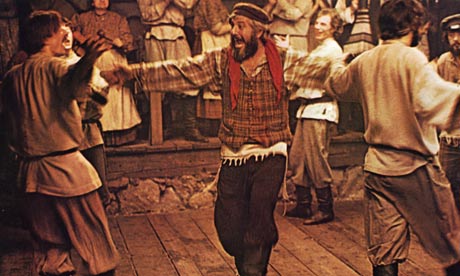Gifted filmmakers are able to delve into the particularity of one group’s life to illustrate universal human experiences, thereby appealing simultaneously to those inside and outside the group. That’s part of the transcendent power of 1971’s Fiddler on the Roof. At one level, the film is steeped in the particularity of Jewish villagers under persecution of the Russian czar, and it’s a powerful story on those terms. But it’s also a moving treatment of crumbling tradition, parenthood, culture and faith which spoke to a whole generation of diverse religious and ethnic backgrounds.
The story focuses on a dirt-poor, devout and intelligent milkman named Tevye, his wife Golde and their marriageable daughters. The family scratches out an existence sustained by the bonds, traditions and religion in their shtetl of Anatevka. As suitors present themselves for his fiercely independent daughters, Tevye struggles to reconcile his traditional beliefs and concern about their material welfare with their desire to choose their own husbands based on love. Meanwhile, rumors of pogroms and forced exiles reach his ears, and he wonders when Anatevka will suffer a similar fate.
This is a very hard judgment to make, but of any Broadway musical, I would cite Fiddler on the Roof as having the best songs. “Sunrise, Sunset”, “Tradition”, “Matchmaker” are among the unforgettable musical pieces Jerry Bock and Sheldon Harnick created for the play. These show stoppers are brought beautifully to life in the film by director Norman Jewison (A Canadian Protestant who got the job because the Hollywood execs assumed that with a name like that, he must be Jewish!). Jewison and the fine cast are equally adept at the dramatic scenes, which are given more prominence in the film than in the play because Jewison wanted a more serious tone to what he saw as a largely grim story.
The big debate about this film concerns the non-casting of Zero Mostel as Tevye, the role he made famous on Broadway. To the bitter disappointment of Mostel and his many fans, the part went instead to Topol, the actor who had played Tevye in the London production of the play. It remains a stellar cast regardless, with an extraordinarily talented set of performers with both musical and dramatic talent.
This clip features one of the many wonderful, touching songs from the movie. It also shows how Jewison and top-flight cinematographer Oswald Morris did much much more than photograph a play; they created a remarkable piece of cinematic art using all the techniques the medium can offer.
L’Chaim!

